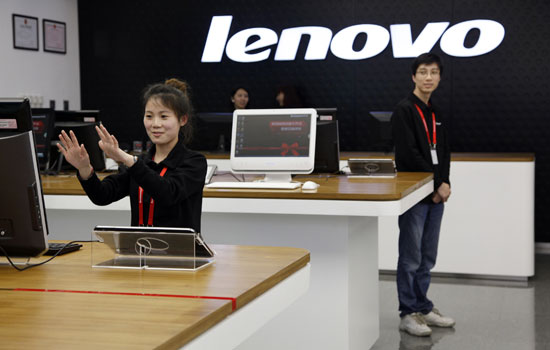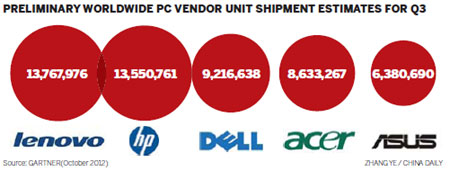
Computer maker's share in global market rises to 15.7% in 3rd quarter
China's personal computer manufacturer Lenovo Group Ltd overtook the US-based Hewlett-Packard Corp in the third quarter to become the largest seller of personal computers in the world measured by shipments, the IT research company Gartner Inc said on Thursday.
|
 |
|
A Lenovo sales associate plays The Body Game on a computer at a Lenovo store in Beijing. Lenovo has overtaken HP to become the biggest computer seller in the world by shipments. [Photo/China Daily]? |

Lenovo's global market share was 0.2 percentage points higher than HP's in the quarter, marking the first time Lenovo has held the largest share of the PC market, according to the Gartner report.
Lenovo, which acquired International Business Machines Corp's PC unit seven years ago, made 15.7 percent of all PC shipments in the third quarter, while HP made 15.5 percent, Gartner said.
Another US-based PC maker, Dell Corp, controlled about 10.5 percent of the market during the period.
Until the third quarter, HP had held the leading position since 2006. Its loss in market share came amid upheavals in its management and changes in its business plans.
At one point, the company had considered spinning off its PC unit, a proposal that was later abandoned by Meg Whitman, HP CEO.
The company has also been hit hard by the world's economic malaise and a shift among customers away from older types of computers toward mobile devices.
"Lenovo has been a beneficiary because of some of the acquisitions it has made and its relatively high exposure to emerging markets, which are outperforming developed markets," said Brent Bracelin, an analyst at Pacific Crest Securities Inc. "It's not just Lenovo. It's part of a bigger trend across the consumer-device market."
Gartner said Lenovo has expanded its market share using "aggressive" pricing.
The research company said 87.5 million PCs were shipped in the world in the third quarter, down 8.3 percent year-on-year. The decline resulted in part from many retailers and consumers waiting to buy PCs that will run on the Windows 8 operating system, which is to be released in late October.
Yang Yuanqing, Lenovo chairman and CEO, said Lenovo will not become complacent.
"Becoming the clear leader in global PC share of course remains one of Lenovo's aspirations, but it also only represents one more milestone in our journey as a company," Yang said.
"We are setting our sights on delivering long-term, profitable growth, while leading the way forward into the PC+ era."
Yang said the company plans to localize its sales and distribution teams in important markets, while maintaining its particular advantages by recruiting talented workers and adding to the product lines it offers.
"In the past, Lenovo had learned from HP, IBM Corp and other Western IT companies," said Wang Jiping, a senior analyst from the US-based research company International Data Corp.
"However, since 2004, it started to develop its own sales and operation model and then acquired IBM's PC division in 2005. Now its business model and strategy have spread to global markets."
Wang said Lenovo in 2009 became the first PC company to place countries into two categories - emerging markets, such as China, India and Brazil, and mature markets, such as the United States and Japan - and adopted different plans for the markets. Such a strategy has now been widely adopted among multinational IT companies.
"The main reason the company is the top PC seller is its strategy of penetrating into lower-tier cities in China and emerging markets," Wang said.
About six years ago, Lenovo started selling more of its products in rural areas in China, a step that Wang believes will contribute to the company's development in the next five years. Lenovo now controls about 35 percent of the Chinese PC market.
In other emerging markets, Lenovo surpassed Dell and HP earlier this year to occupy the top spot in India.
But because of the current global economic slowdown and competition from mobile Internet products such as tablet PCs and smartphones, PC shipments have been increasing at a slower rate. In some places, the rate was even negative in the second quarter, according to IDC.
Meanwhile, a report by the market research company IHS iSuppli suggested that the number of personal computers sold in 2012 is likely to show its first annual decline in 11 years.
It said 348.7 million PCs are expected to be sold in the year, down by 1.2 percent from the 352.8 million sold last year.
"There was great hope through the first half that 2012 would prove to be a rebound year for the PC market," said Craig Stice, an IHS analyst.
"Now, three quarters through the year, the usual boost from the back-to-school season appears to be a bust, and both AMD's and Intel's third-quarter outlooks appear to be flat to down."
IHS said PCs could still start to sell more quickly in 2013, as more people move to buy Windows 8 computers and newer, thinner notebook computers.
"Whether a newly configured PC space could then stand up to the powerful smartphone and tablet markets, however, remains to be seen," IHS said.
IHS said last month that 126.6 million tablet computers are expected to be sold globally in 2012.
Some analysts say tablets will be sold in greater numbers than PCs by 2016 or possibly earlier.
AFP and Bloomberg contributed to this story.